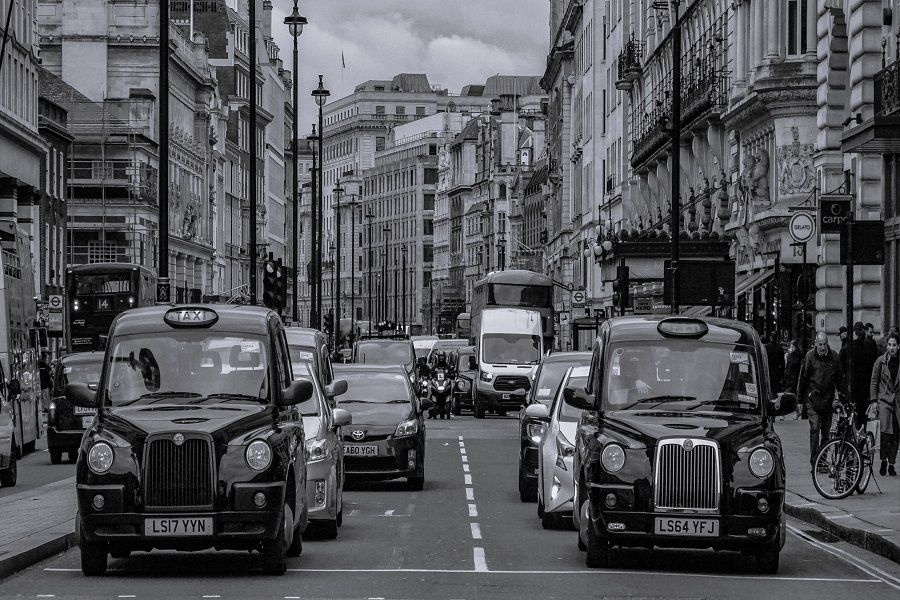Motorists might be feeling under attack at the moment. They are blamed for climate change (CO2 emissions), air pollution (NO2 emissions), road deaths, and congestion.
Many on the radical left take the view that reducing traffic is a good in itself, against the classic economic view that the purpose of infrastructure is to augment the wealth of the nation.
Local and national government have taken a number of actions to reduce traffic and discourage motoring. The UK Government gave £175 million to local councils in 2020 to push for traffic reduction measures. And many councils have been active.
London has gone furthest so far. It has a congestion zone, which is a crude form of road pricing, where drivers pay to enter central London. More controversially, it also has an emission zone, called the ULEZ (ultra-low emissions zone), where drivers of older petrol and diesel vehicles must pay to enter greater London. Aside from the political implications, it’s flawed as an NO2 mitigation policy since independent tests show that modern diesel engines are often much more polluting than older petrol engines. Since Covid, many London boroughs have instituted low traffic neighbourhoods (LTNs) where traffic barriers are put on side streets to force traffic onto increasingly crowded main roads. Lower speed limits have been set by both boroughs and Transport for London (TfL) with 20mph common on many major roads.
Outside London, the Welsh government has proposed 20mph speed limits in towns. In Scotland, improvements to the main road to Inverness have stalled, reportedly due to opposition from the Greens who are the SNP’s coalition partners. The Central Oxfordshire Travel Plan from Oxfordshire County Council promises, in the name of “promoting 20-minute neighbourhoods”, traffic filters at six strategic points in and around Oxford. Out-of-county vehicles will be forbidden to cross these points between 7am and 7pm, and in-county vehicles will be rationed to 25 days per year (or 100 days for city residents). Bristol is proposing a clean air zone (emissions zone), and Cambridge is considering a road user charge.
But what do the public actually think about this? On behalf of the Property Chronicle, we asked our partners at pollster Find Out Now to – surprise – find out now.

We found that the public agree that people use their cars too much, with 46% agreeing and only 15% disagreeing. But when we asked if local councils, mayors and parliament should set rules to make people drive less, a clear majority of 57% disagreed with only 17% agreeing.
We also asked if politicians are making things too difficult for motorists, and 51% agreed with only 16% disagreeing. Among those with a car, 58% agreed that things were too difficult. Even for those without a car, slightly more people agree than disagree.
So although our panel thought that people drive too much, they are clearly against politicians and governments making rules to reduce traffic.
Finally, we asked people whether they supported or opposed a range of traffic reduction measures which have been implemented or proposed by local or central government.
The public are against five of the common anti-traffic measures, in the sense that more people oppose them than support them. The most unpopular policy was a reduction in car parking spaces, with 58% opposed and only 4% in favour. The Oxford-style idea of blocking vehicles from moving from one part of a city to another was opposed by 52%, with only 5% in favour. Congestion charging zones, as exist in London and planned in Cambridge, are opposed by 42% with 17% in favour. Emission charging zones, such as the ULEZ in London and the planned one in Bristol, are opposed by 42% with 19% in favour. Low-traffic neighbourhoods are opposed by 34%, with 19% supportive.
Londoners, despite 42% of them not having a car, are still opposed to low-traffic neighbourhoods (27% net oppose), congestion charging (28% net oppose), and low emission zones (22% net oppose). But this sentiment has not yet translated into action at the ballot box.
But the public are in favour of some measures. Speed cameras are supported by 40% and opposed by only 18%. And lower speed limits in towns are supported by 35% with 23% against. Overall, the public seems to favour safety and convenience, in the sense that they welcome measures to reduce accidents but dislike measures to reduce traffic and prevent journeys.
Around three-quarters of adults live in a household with a car, making car users the vast majority of the adult population. And they don’t like all the new anti-car traffic reduction measures which councils and politicians are introducing. There seems to be a disconnect between the people and their representatives on the issue of the right to drive. And that could cause a political car crash down the road.
Find Out Now interviewed 2,118 GB adults online from 15-16 May 2023. The data was weighted to be demographically representative of all GB adults. Find Out Now and Electoral Calculus are members of the British Polling Council.







